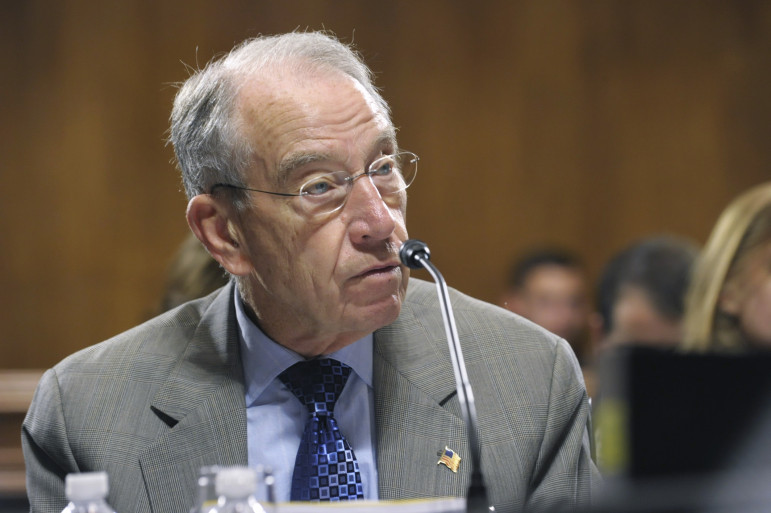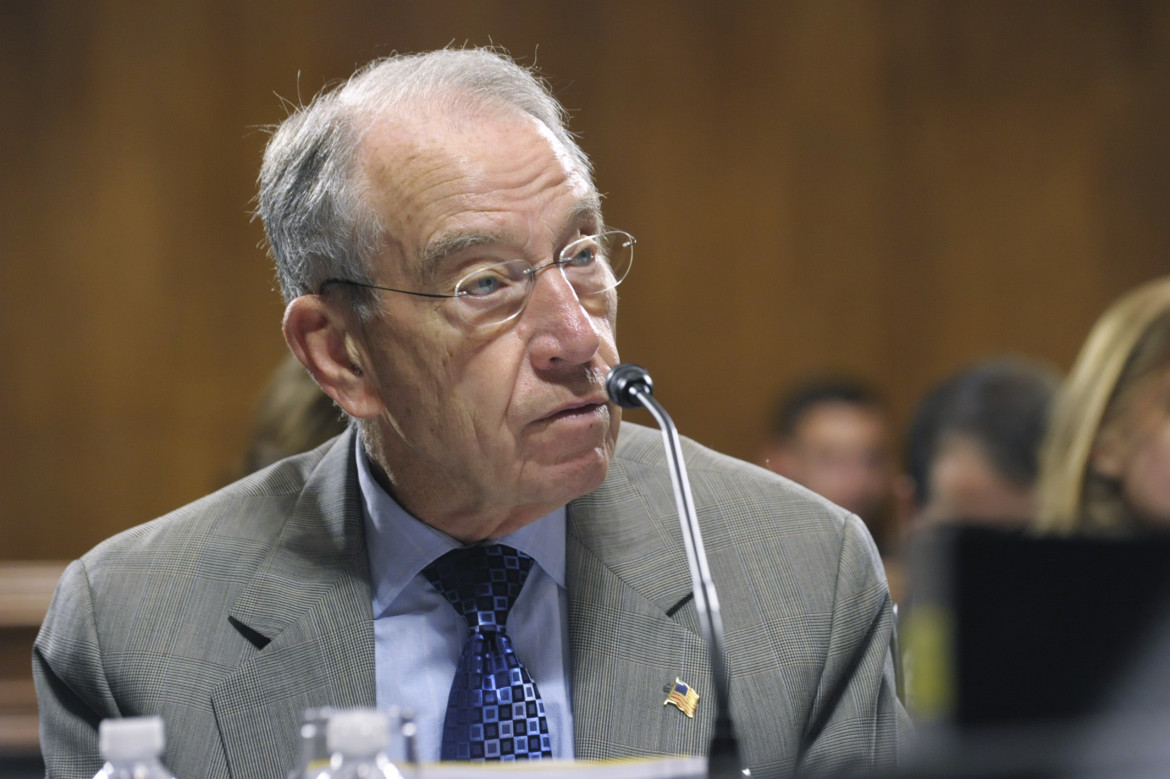
Sen. Grassley's Office
Sen. Chuck Grassley at the Senate committee meeting today.
WASHINGTON — A bipartisan bill that aims to strengthen protections for youth who enter the criminal justice system cleared a key congressional committee today.
The Senate Judiciary Committee approved by voice vote the federal Juvenile Justice and Delinquency Prevention Reauthorization Act of 2015 (S 1169). The law, which is more than 40 years old, sets federal standards and supports for juvenile justice programs in state and local jurisdictions.
The legislation would update the law, adding new policies its supporters say reflect a growing body of knowledge about best practices in juvenile justice. It was last reauthorized in 2002 and lapsed in 2007.
“I am pleased that we have revisited the authorizing statute for some vitally important juvenile justice programs — a statute that is long overdue for an update, to reflect the latest scientific research on what works for at-risk adolescents,” said Judiciary Chairman Chuck Grassley, R-Iowa, at the vote.
[Related: Grassley, Whitehouse Introduce Measure to Reauthorize Juvenile Justice Act]
The legislation would phase out an exception that allows children who commit status offenses to be detained. Status offenses include truancy, running away from home and curfew violations — actions that would never land an adult in jail.
The legislation also would require that juveniles be separated from adults in the criminal justice system during the pretrial period.
States would be required to set measurable ways to reduce racial and ethnic disparities in the juvenile justice system and publicly report the results.
Grassley and Sen. Sheldon Whitehouse, D-R.I., introduced the five-year reauthorization in April.
Since then, lawmakers have added provisions that would make federal funding for evidence-based programs a higher priority, phase out the shackling of girls during childbirth and add grant accountability reforms. The committee approved a substitute amendment that reflects those changes.
Whitehouse said he hopes the reauthorization will continue to move in a smooth, bipartisan manner and stressed the importance of the policy changes it includes.
“It is not a reauthorization that is not controversial because it doesn’t do anything,” he said. “There are some very consequential changes here.”
The legislation also would:
- require the Justice Department to offer training and technical assistance to states on best practice and protocols;
- strengthen provisions to help children with mental health and substance abuse issues; and
- call for states to consider alternatives to detention for nonviolent youth who enter the criminal justice system.
The law has the support of a wide variety of organizations, including youth advocates, victim support groups and conservative criminal justice organizations.
Marie Williams, executive director of the Coalition for Juvenile Justice, said the reauthorization would ensure the most current developments in the field are incorporated in the law. But it’s also an opportunity to remember that the core requirements of the law weren’t always common practice and need to be protected, she said.
“Reauthorizing the law isn’t just about reviewing and refreshing,” she said. “It’s about reminding people that the things we do right can slip.”
Williams said she’s optimistic the legislation’s movement in the Senate will encourage action in the House. A standalone reauthorization of JJDPA has yet to be introduced there.
Marc A. Levin, policy director at Right on Crime, a conservative group, said the legislation has the potential to be better for children, families and taxpayers by focusing on what works best to help children and reduce recidivism.
“This is a great opportunity to align federal policies with these advancements in the field,” he said.
Sens. Richard Blumenthal, D-Conn.; Roy Blunt, R-Mo.; Chris Coons, D-Del.; John Cornyn, R-Texas; Richard Durbin, D-Ill.; Dianne Feinstein, D-Calif.; Orrin Hatch, R-Utah; Amy Klobuchar, D-Minn.; Patrick Leahy, D-Vt., and Marco Rubio, R-Fla., were co-sponsors.
The legislation next moves to the full Senate.
More JJDPA-related stories:
House Bill Would Reauthorize the Juvenile Justice and Delinquency Prevention Act
Williams: Why the JJDPA Still Matters

This is an excellent move in the right direction. But it may not be broad enough, because the definition of “nonviolent” offenses might be too narrow. I haven’t looked up this particular bill, but offenses that are called “violent” in some statutes do not always involve knocking old ladies on the head or shooting up a street corner. They may include possessing–not using–a weapon during a drug transaction, or a sexual offense committed when the “offender” was 14, or some other activity that does not actually involve violence as the term is normally used.
The Senate Judiciary JJDPA bill is a step in the right direction. Too many children, many from disadvantaged economic families are railroaded without competent defense counsel into the seriously flawed Federal-State criminal justice system, ruining their academic prospects and professional careers.
And a vast majority of the judges incarcerating these kids are former criminal prosecutors who advanced their own careers by appearing to be “tough on crime” and more interested in expediting cases than real Justice.
Pingback: Senate Judiciary Committee Approves JJDPA Update; News Roundup | Reclaiming Futures
Please remember that in the era of tough on crime allot of young men and women ages 18-25 were sentenced to Life and Life without parole . When setting new guidelines please do not exclude these group of adolescents. This group of young people are being denied every opportunity for a second chance. Even when they meet the qualifications for medical release. They are denied any hope for release. This only perpetuates Mass Incarceration.